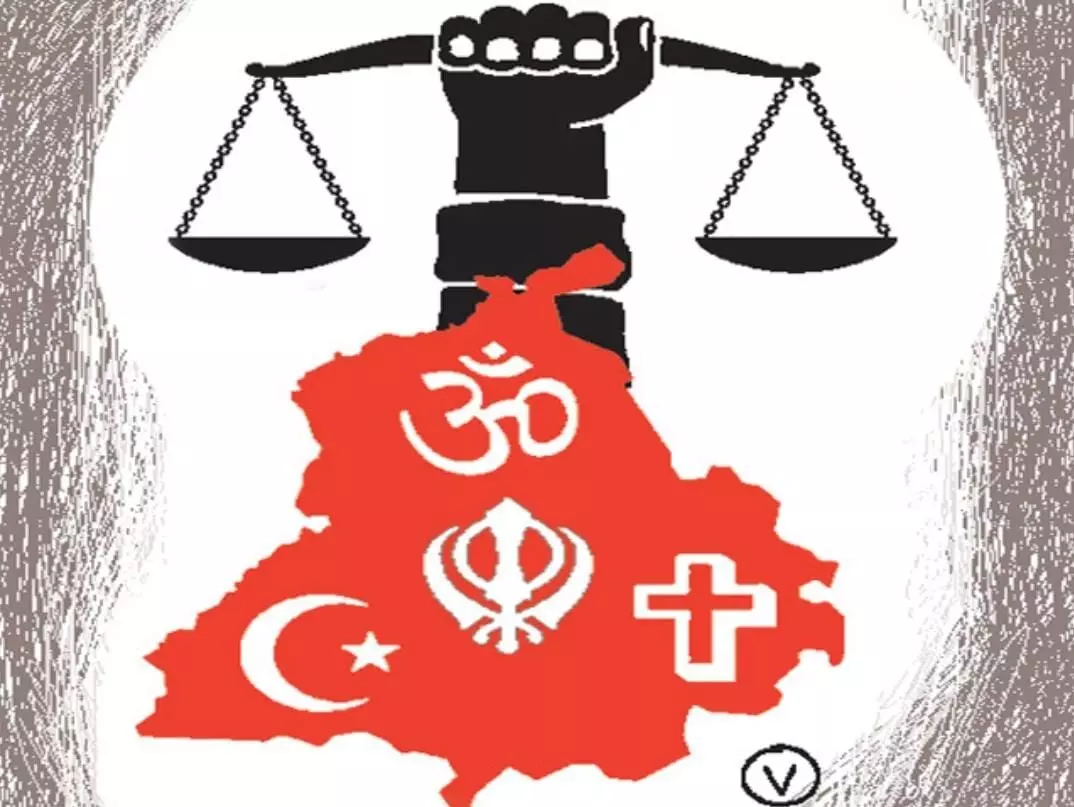Irreligiousity of Religious Civilization
Recent derogatory remarks on Prophet Muhammad by BJP MLA Raja Singh have caused outrage yet for most Indians, the inclusiveness of India is unquestionable
By Syed Ghiyas Uddin
The recent derogatory remarks on the life of the Prophet Muhammad by BJP MLA Raja Singh have outraged the religious feeling of the Muslim community. However, few justified it as a legitimate act in the protection of Dharma and many viewed it as the political stratagem of the BJP in Telangana for coming elections.
Be that as it may, the concern for an average Indian is the recurrent sacrilege against religious figures. Not just intra-religious but also inter-religious. Questions are now about the celebrated idea of Sarva Dharma Sambhava.
A man was beaten to death for a sacrilege attempt at Golden Temple and several desecrations took place in 2014 and 2015. It became a major political issue during Punjab elections in 2017 and 2019. Shridi Sai Baba's idol was demolished at Delhi Temple and devotees' were distressed
However, for most Indians, the inclusiveness of India is unquestionable. Its civilization legacy is particularly reflected in its Vedic-mystical identity. However, one has to remind that fascism rose to power in the World at the seat of power of the Catholic Church. The recurrent anti-Muslim narratives have become a part and parcel of Indian polity, especially in North India.
The Islamaphobic Twitter campaign during the pandemic, called Indian Muslim human bombs, corona jihadi and whatnot. Nupur Sharma's offensive remarks on Prophet Muhammad in June 2022 have caused colossal damage to the diplomatic relations between India and Muslim World. In this context much has been written about the crucial role of Gulf countries in the Indian Economy.
Polemic against Islam:
These remarks can't be read in isolation, or it is an individual's view as projected by the BJP. In both these cases, the BJP has issued a temporary-suspension notice as a sign of formal disassociation and reasoned it contrary to party lines. However, the BJP being a part of an ideological movement, the party lines are subservient to its ideology. These derogatory remarks against Prophet Muhammad reflect the shift in Hindu Right that seeks inspiration from Western writers and politicians on a polemic against Islam. The tweets in support of Nupur Sharma by Geert Wilders, a Dutch politician explain the camaraderie. It is sure that these remarks will jeopardize the Indian interest in the Muslim world. But it will acquire influential space in international politicians who are inherently anti-Islam.
The constant reminders, in various articles, that Indians are the largest expatriates and they remit about $ 35 billion annually. Nearly 60 percent of India's imports from the Gulf Countries Cooperation (GCC) are crude oil and natural gas. There exists the anti-Muslim spate in local and national politics and it resonated internationally.
The shift in the Hindu-right approach toward Muslims is briefly discussed by right-wing historian Dr. Koenraad Elst in his book `Decolonization The Hindu Mind Ideological Development of Hindu Revivalism: "What Golwalker says, is: Islam is all right, the problem lies with the Muslims." The view of Hindu revivalists from Dayananda to Ram Swarup is exactly the opposite: the problem is not Muslims but Islam. "Muslims are simply our estranged countrymen who have to liberate from the mental stranglehold of Islam". The latter view about Islam and Muslims is appealing to the audience of Hindu Right.
The Hindu-right wing YouTube channels are constantly hosting Islamaphobic Western writers' viz. Robert Spencer and ex-Muslims explain these shifts. The polemic against Islam in India is not nascent in ideological terms.
In1980's Hindu-Muslim issues/riots were discussed as a conflict between two tribes, but now the Hindutva has transformed it and made these conflicts between two-world views. As S.Gurumurthy put it, the Hindu society is perhaps the only society in the world that faced and then survived the Islamic theocratic Civilization. The underlying idea is that the world will have to learn Hindu values if it is to defeat 'Islamic theocratic civilization'.
Hindu-Nationalist; Indian Diaspora & Globalization:
These derogatory remarks on Prophet Muhammad and their impact on Indian expatriates in the Muslim world are one side of the coin. The other side is the Indian Diasporas in western countries. If the expatriates are influenced by National politics, the Indian Diaspora has the capacity to influence national politics.
Benedict Anderson argues that the rise of transnational groups had made nationalism obsolete. On contrary, he argues that his peculiar kind of nationalism breeds migration, mass communication, and ethnicity. It may well be that we are faced here with a new type of nationalist: 'long-distance nationalist'.
For mechanically a citizen of the state, in which he comfortably lives, but to which he may feel little attachment, he finds it tempting to play identity politics by participating ( via propaganda, money, weapon, anyway but voting) in the conflict of his imagined hometown. But this citizenship less participation is inevitably non-responsible. Our long-distance hero will not be answered for, or pay the price of, the politics he undertakes. He is also easy prey for shrewd political manipulators in his hometown as quoted by Ingrid Therwath in Working for India or against Islam? Islamophobia in India American Lobbies.
Twitter (Mass-communication) plays a crucial role in the dissemination of feelings of long-distance nationalistic, the havoc it is reflected in our day-to-day life. This Mass-communication has over-hauled the idea of territorial-based nationalism. The greater concern for Indians is that Indian Muslims being 200 million, have to knock on the doors of the International community to make the Modi government heed their plight further aggravates the place of Muslims in the apparatus of the nation-state.